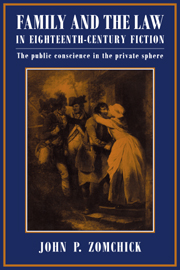Book contents
- Frontmatter
- Contents
- Preface
- Acknowledgments
- 1 Introduction
- 2 Roxana's contractual affiliations
- 3 Clarissa Harlowe: caught in the contract
- 4 Tame spirits, brave fellows, and the web of law: Robert Lovelace's legalistic conscience
- 5 Roderick Random: suited by the law
- 6 Shadows of the prison house or shade of the family tree: Amelia's public and private worlds
- 7 The embattled middle: longing for authority in The Vicar of Wakefield
- 8 Caleb Williams: negating the romance of the public conscience
- Bibliography
- Index
2 - Roxana's contractual affiliations
Published online by Cambridge University Press: 10 February 2010
- Frontmatter
- Contents
- Preface
- Acknowledgments
- 1 Introduction
- 2 Roxana's contractual affiliations
- 3 Clarissa Harlowe: caught in the contract
- 4 Tame spirits, brave fellows, and the web of law: Robert Lovelace's legalistic conscience
- 5 Roderick Random: suited by the law
- 6 Shadows of the prison house or shade of the family tree: Amelia's public and private worlds
- 7 The embattled middle: longing for authority in The Vicar of Wakefield
- 8 Caleb Williams: negating the romance of the public conscience
- Bibliography
- Index
Summary
In Trade, as in Gaming, Men know neither Father nor Mother, Friend or Relation; … And if I can get Money by Trade, with getting it fairly, I am to do it against any Body's Interest or Advantage.
Daniel Defoe, ReviewIntroduction
Roxana, the heroine of Daniel Defoe's last novel of the same name, is a precursor of the novel's normative subject: a character who bases a claim to freedom on natural law and its enactment in the positive laws of civil society. It is not as wife, or “widow,” or mistress that Roxana gains freedom; rather, it is as one who makes bargains. Her emergence as juridical subject is incomplete, however, because she remains split between affective needs and possessive aspirations. Defoe's narrative fails to integrate the various positions occupied by the heroine, and Roxana never attains the status of full-fledged juridical subject. His final novel – which some have seen as a major step toward the kind of consequentialist plotting that will come to characterize the novel's “great tradition” – presents a clear picture of potential contradictions inherent in the liberal market society that Roxana and her partners inhabit. Roxana may choose to know neither friend nor relation, but she cannot prevent them from making claims upon her.
In his study of Defoe's novels, to which my reading is indebted, John Richetti has argued that the novels' heroes and heroines search for “a comprehensive autonomy of the self.” About Roxana in particular, Richetti makes the following observation: “Roxana's story as a whole exemplifies the free individual who is somehow free precisely to the extent that he understands social necessity.”
- Type
- Chapter
- Information
- Family and the Law in Eighteenth-Century FictionThe Public Conscience in the Private Sphere, pp. 32 - 57Publisher: Cambridge University PressPrint publication year: 1993



